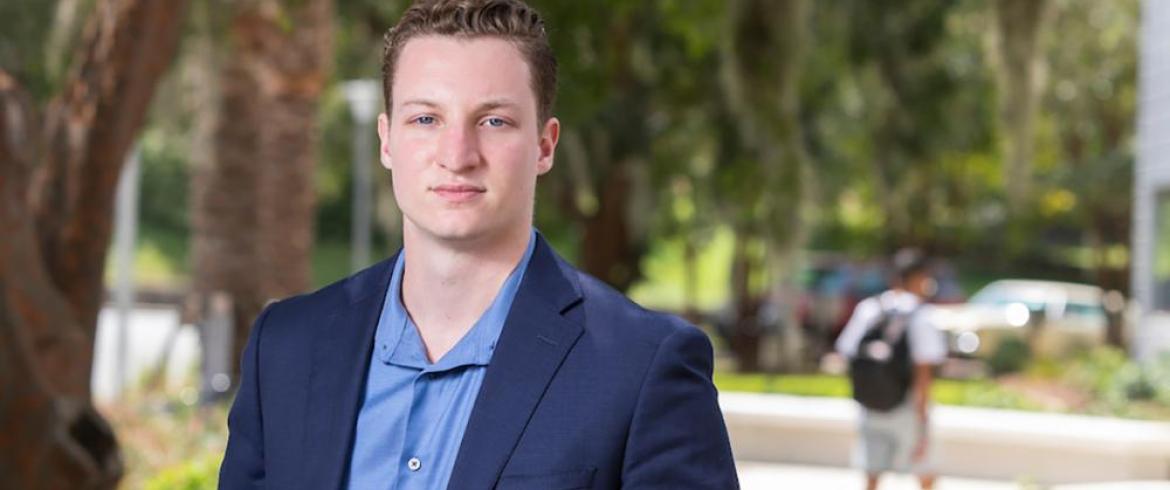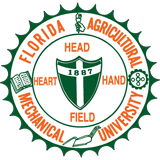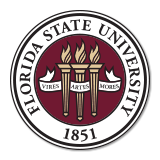
Nicholas DiRoberto is a senior at Florida State University studying biomedical engineering at the FAMU-FSU College of Engineering. (Photo: M Wallheiser/FAMU-FSU Engineering)
Undergraduate Student Spotlight
Nicholas DiRoberto is a senior at Florida State University studying biomedical engineering at the FAMU-FSU College of Engineering. Originally from Hollywood, Florida, the eclectic student plans to pursue a law degree after graduating. He’s currently researching genetic engineering, tissue engineering and biomedical devices.
Tell us about yourself? Fun facts?
Since a young age, I have been interested in science. It is a truly fascinating experience to unravel the secrets of nature and wield them to the benefit of mankind. Additionally, I have written a novel that is currently undergoing the editing process. It will likely be self-published as an Amazon e-book in late December 2021. I am also the president of my fraternity.
What is your area of research?
Biomedical engineering has a mind-boggling number of subfields within its domain, but I am particularly interested in genetic engineering, tissue engineering and biotechnology. I firmly believe that by manipulating the machinery of the cell and making advancements in biotechnology, humanity will extend its lifespan, grow functional organs in vitro and cure pathologies in ways that were never thought possible.
Why engineering?
Strangely enough, I am not actually going to be an engineer (at least for the foreseeable future). From the beginning of undergrad, my plan has been to go to law school. Why engineering? Because, after shadowing a judge in high school, I learned that the generic fields of law are heavily saturated with applicants, and finding a job is extremely hard if one takes the usual route of a major in the humanities or political science. I was advised that the key for success in law is to find a niche field that is both highly desirable and highly interesting.
One such field is intellectual property (IP) and patent law, which few law school students pursue because it requires a background in STEM. After researching what IP law entailed and realizing that it would allow me to merge my love of science with my interest in law, I was hooked. I changed my major from creative writing to biomedical engineering during the summer of my freshman year—and haven’t looked back since.
What is the most exciting thing you are working on right now? Favorite class?
I am currently working on a senior design project with a peer team. Our goal is to design assistive technology for a severely disabled child. The details are still in the conceptual phase, we are looking forward to making a positive impact with our design.
My favorite class at the moment is Introduction to Synthetic Biology. It has exposed me to a brand-new field with seemingly limitless applications. One aspect of synthetic biology involves the manipulation of an organism’s genetic code to express genes desired by the engineer. The interesting thing is, through advancements in DNA synthesis and production, we will likely be able to handpick anatomic traits and create completely artificial organisms with their own unique genetic code. This will result in an entirely new animal kingdom (possibly called “Synthetica.”)
What inspires you?
I am inspired by my firm belief that we are standing on the brink of a biological renaissance. Through advancements in biotechnology, bioengineering, synthetic biology and other related fields, humanity will advance to a degree that our ancestors could have only dreamed of.
I envision a future in which we alleviate the most destructive of our diseases. Genetic conditions will be cured at an embryonic level. Artificial organs will be grown in labs. Severed limbs will be regrown from the very spot of amputation. The cellular aging process will be reversed. Humans will merge with machines, and life as we know it will never be the same.
Ultimately, technology will advance to the point where it is indistinguishable from magic. Within all of these advancements, there are stories are waiting to be told. Stories from our generation of engineers, and stories from the generations that will come after. I want to be a part of those stories, in any way that I can.
What are your long-term goals? What do you hope to accomplish?
My long-term goals to graduate from law school, become employed as an IP attorney, and use my position on the cutting edge of new technology as well as my background in biomedical engineering to make well-informed investments in biotech startups. Ideally, these investments would turn out favorably, and then I would use the profits to start my own biotech company, or pursue another scientific route that interests me. Of course, the future is hard to predict, but that is my plan for now. I also would like to write a science fiction novel at some point.
What advice would you give students interested in biomedical engineering?
Biomedical engineering is not an easy major. In fact, it is one of the most challenging majors that FSU offers. You have to understand biology, chemistry, anatomy, physics, calculus, and the basic principles of chemical, electrical and mechanical engineering.
However, those who survive the rigorous course-load will be in a unique position to contribute to humanity in a way that no one else can. Other engineers cannot do what we do. Doctors cannot do what we do. Biochemists cannot do what we do. You will be rewarded for your efforts.
As a side note, when dealing with hyper-complex concepts (which you will see often in biomedical engineering), I find that it is best to deconstruct the concepts to their simplest components, and then build up from there. Anything complex is made up of many simple parts. It is up to you to assemble them in the right order.

